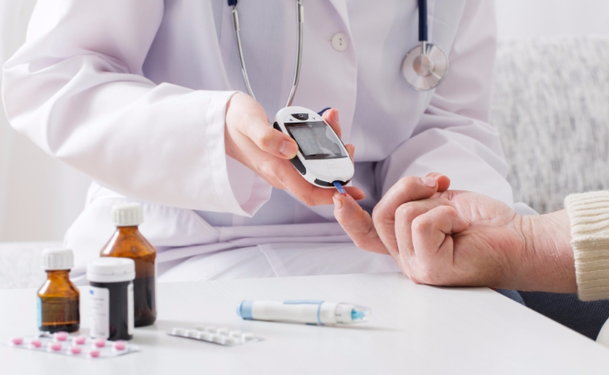If you have diabetes, many of the things that you can do to manage your health will also be good for your circulation and veins. Learn how diabetes and vein health are related, and what you can do to stay healthy.
How Diabetes Affects Vein Health
High blood sugar, or glucose, caused by diabetes can damage your veins and arteries, as well as the nerves that control your heart and blood vessels. This increases your risk of heart disease and stroke as well as certain vein diseases.
- Many people with diabetes also have chronic venous disease (CVD).
- Diabetes may make your CVD symptoms worse.
- Diabetes may increase your risk of blood clots in your leg (venous thromboembolism) by a small amount, although the results of scientific studies are mixed.
Diabetes and Venous Ulcers
Two major complications of diabetes are nerve damage (neuropathy) and poor circulation (peripheral arterial disease, or PAD). These can cause slow-healing or non-healing sores (ulcers) in the feet.
These diabetic ulcers are similar to venous or stasis ulcers. However, venous ulcers are caused by blood pooling in the veins of the legs due to ineffective valves in the veins.
If you have diabetes and venous ulcers, then keeping your blood sugar under control can help the wounds heal faster.
The main signs of diabetic neuropathy or peripheral arterial disease (PAD) include:
- Bunions
- Dry skin on the feet
- Hammer toes
- Sores or ulcers on the feet that do not heal
- Thickened toenails
- Weak or absent pulses in the feet or lower legs
Diabetes, Heart Disease and Stroke
Its crucial to keep your blood sugar under control by following your doctor’s instructions for insulin injections, medications, diet and exercise. You can also reduce your risk for diabetes complications and vein disease by eating a well-balanced diet, maintaining a healthy weight, exercising regularly and giving up smoking.
These things will also reduce your risk of heart disease and stroke. People with diabetes are at an increased risk of these diseases.
Other factors also increase your risk of heart disease and stroke, such as:
- Smoking
- High blood pressure
- Abnormal cholesterol levels
- Obesity and belly fat
- Family history of diabetes
Taking Care of Your Feet
By being diligent, you can prevent the progression of diabetic nerve and vein damage in your feet. This is especially important because once nerve damage happens, it cannot be reversed.
Healthy veins and nerves mean healthy feet. In addition to keeping your blood sugar under control, you can keep your feet healthy by:
- Checking your feet daily for signs of diabetic neuropathy or peripheral arterial disease
- Visiting your doctor at least once a year to have your feet examined
- Wearing shoes that are wider in the front to allow the toes room to move
- Washing your feet every day
- Wearing shoes and socks at all times
- Using lotions to keep the skin on your feet soft and smooth
- Protecting your feet from exposure to heat and cold
- Eating healthy
- Exercising regularly
- Quitting smoking
When to Seek Medical Care
If you have diabetes, you should see your doctor at least once a year to have your feet checked. If you experience any of the following symptoms between visits, contact your doctor as soon as possible:
- Pain in the calves, thighs or muscles of the buttocks. These are common symptoms of peripheral artery disease.
- Pain in your feet, even while resting.
- Slow-healing or non-healing sores on the feet.
Also, if you have any signs of a heart attack or stroke, call 9-1-1 and seek emergency medical services immediately.
If you have other vein conditions, such as spider or varicose veins, a vein specialist can talk to you about your treatment options. These treatments offer the same benefits for people with diabetes as they do for the rest of the population—fewer symptoms, improved quality of life and keeping the vein disease from getting worse.
Updated on Aug. 14, 2017


